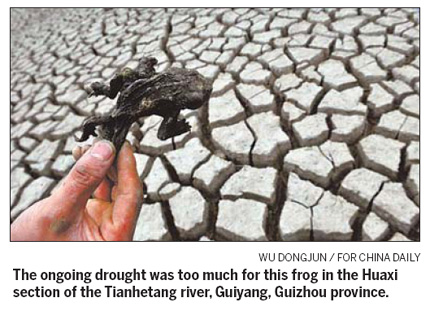Villagers struggle for survival
Facing the worst drought in nearly a century in Southwest China's Guizhou province, people here are struggling for survival against a prolonged water shortage that has threatened their very lives.

Zhang Qipin, a 17-year-old boy, and his mother queue for hours each day along with hundreds of others in Yinggongshan, a village of 3,500 residents in Banqiao township of Pan county, to collect drinking water from three fire vehicles carrying the vital liquid from town.
It has become a daily routine for survival since early February, when no more water could be taken from nearby sources, including water cellars at home.
Each day, his family can bring four to six buckets of water home, about 15 liters per person.
"That was not enough to feed the four buffalos we kept for farming," he said.
"To save water, my family sold three buffalos at a low price around mid-May, with only one left for farming and plowing."
He was hurriedly carrying two buckets of water on a pole across his shoulders to store at home and return for two more buckets of water - an extra ration they were offered on Monday.
Zhang Xiaopan, 48, sold both animals he had, one buffalo and one pig, to deal with the water rationing.
"I have to work outside to earn money and buy back my buffalo for planting corn before sowing season," he said.
In Panxian county, nearly 657,000 residents, or more than half the population, have been short of drinking water since the beginning of the drought, said Wang Gang, the county magistrate.
"What I worry about most is that, as the drought continues, collecting water has become a heavy burden for them, which leaves no more time for farming or working outside to recoup the losses they had from the drought," he said.
In a few of the worst hit mountain villages without roads for vehicles to bring in supplies, farmers had to pay for water, local officials said.
Life seemed to be a bit easy for those living in Xueguantun, a village with part of its rice paddy near the Neisudu, a local river where water was dammed upstream as a reservoir and is often sluiced downstream for villagers' drinking and farming.
"The vegetables we are planting can be harvested in about 60 days and sold on to market," said Guo Jingzhi, head of the village.
"We are trying our best to save ourselves and mitigate further damage caused by the drought, instead of merely waiting for relief from the government."
 0
0 






